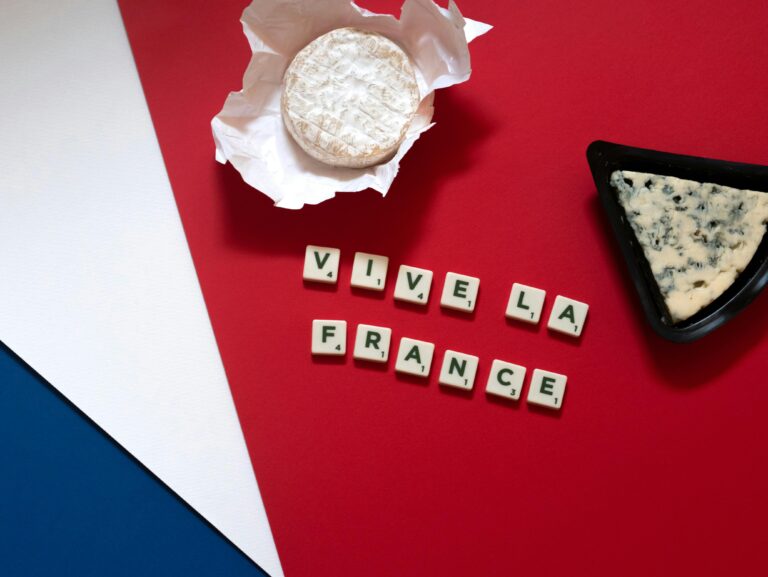Bon vs Bien in French

Does French seriously need two words for “good?”
Well, technically, yes, it does, for the same reason that English has “good” and “well.”
In this grammar guide, we’ll explain the big differences between bon and bien—you’ll see that they’re actually quite different from each other.
Then we’ll walk through specific cases where you always use one or the other, to further cut down on any guesswork.
Download: This blog post is available as a convenient and portable PDF that you can take anywhere. Click here to get a copy. (Download)
Differences Between Bon and Bien
The basics of bon and bien are pretty easy for English speakers, considering we have a very similar pair of words: “good” and “well.”
Typically, bon and “good” are used as adjectives:
Le repas est bon. (The meal is good.)
On the other hand, bien and “well” are usually used as adverbs:
Il joue bien au foot. (He plays soccer well.)
Unfortunately, that’s not all there is to these two short words! Both can act as adjectives, adverbs, and even nouns, depending on the context. Let’s explore the differences between bon and bien in more detail.
Bon and bien as Adjectives
As we’ve already seen, bon is usually an adjective in French, which means that it describes a noun.
Meanwhile, Bien can only act as an adjective when used with a state-of-being verb such as être (to be), penser (to think), croire (to believe) and sembler (to seem).
Consider the following examples of bon and bien acting as adjectives:
| Bon | Bien | ||
|---|---|---|---|
| C’est une bonne idée. | That's a good idea. | Ce restaurant est vraiment bien. | This restaurant is good. |
| C’est un bon prof. | He's a good teacher. | On est bien ici. | We are comfortable here. |
| Mon chien est bon. | My dog is good. | Alors, il était bien ce film ? | Well, was the movie any good? |
| C'est une bonne idée de boire du café. | It's a good idea to drink coffee. | Très bien ! | Very good! |
Bon and bien as Adverbs
Just as bon is usually an adjective, bien is usually an adverb. Adverbs in French are used to describe verbs, adjectives, and other adverbs.
Bon very rarely acts as an adverb, although it can be used to mean good or pleasant.
In these examples, bon and bien act as adverbs:
| Bon | Bien | ||
|---|---|---|---|
| Cette fleur sent bon. | The flower smells good. | Marie travaille bien. | Marie works well. |
| Oui, parfait, c’est bon pour moi. | Perfect, that's good for me. | Je me sens bien. | I feel fine. |
| Ce plat est très bon. | The dish is very good. | Je ne me sens pas bien. | I don't feel well. |
| Il fait bon vivre ! | It's good to be alive! | bien mieux | much better |
Bon and bien as Nouns
As a noun, le bon can mean “advantage” or be used to refer to “the good part” of something. It can also mean “voucher”, just so you know!
Le bien, as a noun, means “good” in the conceptual or spiritual sense—as in the phrase “good vs. evil”. It can also mean “possession” as in the phrase “treasured possession.”
| Bon | Bien | ||
|---|---|---|---|
| Il est parti pour de bon. | He's gone for good. | le bien et le mal | good and evil |
| Cette fois, on le fait pour de bon. | Let's do it for real this time. | C’est pour son bien. | It's for his own good. |
| Il est fâché pour de bon. | He's really angry. | son bien le plus précieux | his most treasured possession |
| C’est la bonne. | It's the right one. | le bien public | the public good |
When to Use Bon in French
Talking about the senses
One very common usage of bon is to compliment someone’s cooking—in other words, describing a food’s good taste. Just as bon is used to describe taste, it’s used to describe other senses as well.
Le gâteau a bon goût. (The cake tastes good.)
Le café sent bon. (The coffee smells good.)
When something is done/ready
You can simply use bon to indicate that something is finished or ready.
“C’est bon.” (“It’s ready.”)
To indicate “enough”
You can also use bon to indicate “enough. For example, if someone is pouring wine for you and your glass is filled to your liking, you say:
C’est bon. (That’s enough.)
As an adverbial adjective
Though it’s rare, sometimes bon is used as an adverbial adjective, which means that it provides more information on a verb, another adjective or an adverb. A common example of this is when talking about smell.
Les fleurs sentent bon. (These flowers smell good.)
You can also use bon with the construction il fait + bon + verb to mean that it’s generally good to do something.
Il fait bon se promener. (It is good to go walking.)
Il fait bon travailler. (It is good to work.)
Additionally, bon can be used to modify certain special verbs like sembler (to seem) and tenir (to hold). When bon is used with these verbs, the meaning is a bit more broad than “good.”
Tiens bon ! (Hold on!/Hang in there!)
Ça semble bon. (It seems good/okay.)
Exclamations and wishes
French speakers often use bon in short, exclamatory phrases that express good wishes to someone.
Bonne chance ! (Good luck!)
Bon voyage ! (Have a good trip! — Literally, “Good trip!”)
Bonne idée ! (Good idea!)
Bon appétit ! (Dig in!)
When something is correct
You’ll also need to use bon to express when something is correct.
Ce n’est pas la bonne réponse. (It’s not the correct answer.)
Oui, ces papiers. Ce sont les bons devoirs pour ce soir. (Yes, these papers. These are the correct homework sheets for this evening.)
When something is enjoyable or pleasant
You use bon to talk about something—a period of time or an event, for example—that was enjoyable or pleasant.
J’ai passé de bonnes vacances. (I had a pleasant vacation.)
C’était un bon Noël. (It was a good Christmas.)
When talking about competency, kindness or quality
You can use this bon to discuss a person’s character or skills, or the quality of something.
Elle est une bonne actrice. (She’s a good actress.)
Elle est vraiment bonne. (She is truly good. — In this case, the sentence is describing someone’s overall kindness or character as good.)
C’est le bon vin. (It’s the high quality/good wine).
As the noun “voucher” or “coupon”
Il y a un bon pour obtenir deux pantalons pour le prix d’un. (There’s a coupon for getting two pants for the price of one.)
When to Use Bien in French
Bien has fewer uses than bon, but there are still six possibilities to use it correctly.
With state-of-being verbs
Use bien with state-of-being verbs such as être (to be), penser (to think), croire (to believe) and sembler (to seem).
Il est bien comme prof. (He is a good professor.)
Je pense bien à toi. (I think well of you.)
When giving an opinion
Think of this rule as expressing your likes/dislikes or satisfaction/dissatisfaction.
Le film était bien ! (The movie was good!)
This is different than calling the movie good (in which case, you use bon). Instead, you’re using this expression to specifically say that you liked it.
When talking about “wellness”
Talking about how you feel—specifically, whether or not you feel well—is another situation where you’ll need to use bien.
Je me sens bien. (I feel well.)
Tu te sens bien aujourd’hui ? (Do you feel well today?)
There’s also an informal twist on this usage you can use with friends to talk about someone who’s behaving strangely:
Elle n’est pas bien !? (Is she crazy? — Literally, “Is she not well?”)
To say “really” or “very”
Using bien to express “really” or “very” is a common habit among native French speakers.
Elle est bien méchante. (She is really mean.)
Je suis bien fatigué. (I am very tired.)
Il fait bien chaud. (It’s really hot.)
As the noun “the good” or “good/belongings”
Savez-vous distinguer le bien du mal ? (Do you know good from bad?)
Il a fait don de ses biens à une œuvre de bienfaisance. (He donated his belongings to a charity.)
As “good” in the expression très bien
Très bien ! (Very good!)
FluentU takes authentic videos—like music videos, movie trailers, news and inspiring talks—and turns them into personalized language learning lessons.
You can try FluentU for free for 2 weeks. Check out the website or download the iOS app or Android app.
P.S. Click here to take advantage of our current sale! (Expires at the end of this month.)
Where to Practice Bon vs. Bien Online
The best way to learn the rules below is to apply them. Here are the best online tools to practice using bon and bien in different contexts:
- Test your knowledge with the fill-in-the-blank quiz offered by SoftSchools, a site that provides free educational resources for a variety of subjects.
- Or, you could try a short multiple choice quiz on Study.com, a site with various tests and study outlines.
- Try these bon vs. bien flashcards on Quizlet, an educational site that provides free study sets, games and tests. Their set of flashcards has a fill-in-the-blank sentence on one side and the correct answer (bien or bon) on the other.
- Finally, Tex’s French Grammar, a French learning site run by the University of Texas, has some exercises to practice not only bon and bien but also mieux (better) and meilleur (better).
Whew! Those were a lot of grammar rules, but you’ve earned a break now that you know when to use bon vs. bien like a native speaker would!
Download: This blog post is available as a convenient and portable PDF that you can take anywhere. Click here to get a copy. (Download)
And One More Thing...
If you like learning French at your own pace and from the comfort of your device, I have to tell you about FluentU.
FluentU makes it easier (and way more fun) to learn French by making real content like movies and series accessible to learners. You can check out FluentU's curated video library, or bring our learning tools directly to Netflix or YouTube with the FluentU Chrome extension.
One of the features I find most helpful is the interactive captions—you can tap on any word to see its meaning, an image, pronunciation, and other examples from different contexts. It’s a great way to pick up French vocab without having to pause and look things up separately.
FluentU also helps reinforce what you’ve learned with personalized quizzes. You can swipe through extra examples and complete engaging exercises that adapt to your progress. You'll get extra practice with the words you find more challenging and even be reminded you when it’s time to review!
You can use FluentU on your computer, tablet, or phone with our app for Apple or Android devices. Click here to take advantage of our current sale! (Expires at the end of this month.)











